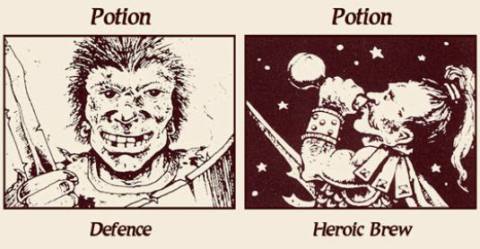The announcement of a new live service game frequently sends unpleasant shivers down my spine. “Oh no, here we go again,” I think, as I steel myself for the inevitable disappointment where potentially good ideas are once again sacrificed on the altar of trend-chasing by a creatively bankrupt publisher. As a treat, I might go on a wee rant. A dash of cynicism. A pinch of melodrama. Job done. But sometimes a game like Helldivers 2 comes along and I'm forced to remember that, actually, there's absolutely nothing wrong with live service games. Pity me.
I've been hooked on what we now call live service games for almost as long as I've been gaming. Before we had this gargantuan umbrella term, I was ignoring homework and monopolising the family PC while living it up inside MUDs and MMOs. The latter remains an obsession I just can't shake, but now I spend as much time in games like Path of Exile and Warframe—different genres, different philosophies, but still built on this idea of persistence, community and continual developer support.

But—and this is where all the vitriol and cynicism comes from—this model is ripe for exploitation by elements in this industry who can't see the value in a game that doesn't milk its players to fuel the constant growth that shareholders demand. This goes beyond things like the blight of predatory microtransactions, and just as damaging is the sapping of creativity, where some of the best teams in the world are wasted on follies like the catastrophically ill-conceived Anthem.
Next week, it'll be five years since Anthem's miserable launch; five years since BioWare released a game that wasn't a remaster. A developer once famed for its exceptional singleplayer RPGs, now it exists more as a lesson in mismanagement—a dramatic fall from grace that it's yet to recover from. That should have been a wake-up call. You can't just throw talent at these big projects and hope for the best. A successful live service game requires a very specific environment for it to thrive, and probably not a studio famed for its story-driven, singleplayer games.
Clearly this was not a lesson that Warner Bros. or Rocksteady learned. Suicide Squad: Kill the Justice League is tragically remiscent of Anthem. The cutscenes and constant banter speak to Rocksteady's storytelling background. The joyous way the characters leap and bound around the map evoke the effortless traversal mechanics of the Arkham series. The stuff people want from a Rocksteady game. The rest? A bit of Borderlands. A touch of Destiny. A hodgepodge of other live service games awkwardly stitched together to create a misadventure lacking a cohesive identity. Ultimately: a big waste of time.
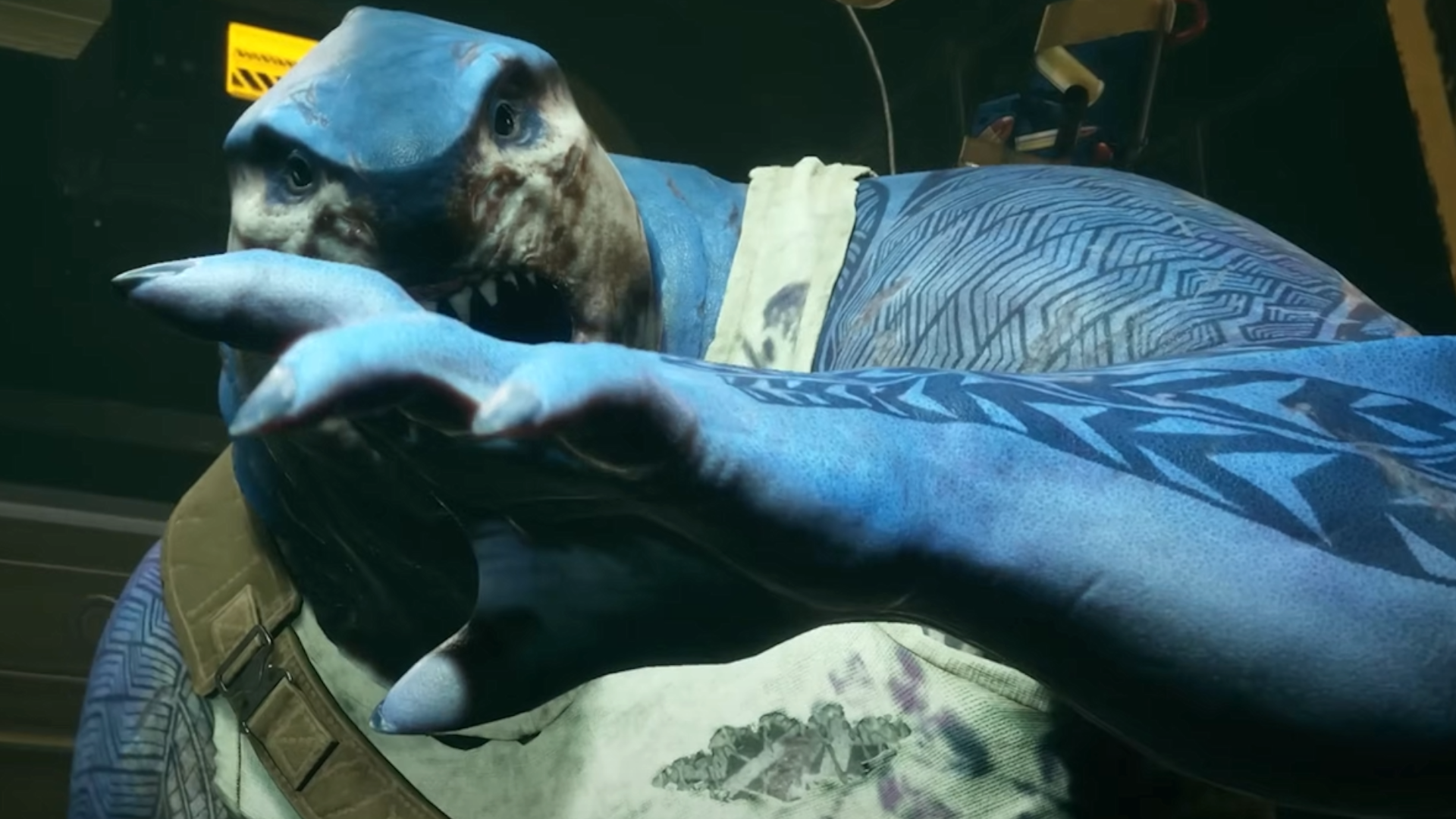
And just on the horizon we've got Ubisoft's constantly delayed Skull & Bones. From what we've seen in the open beta, you shouldn't hold your breath. Seemingly prescriptive and uninspired, there's little evidence of it using the live service model or multiplayer systems creatively, leaving me to wonder why anyone would play it instead of Sea of Thieves.
Humanity's salvation
Helldivers 2, though, has thoroughly brightened up the world of live service games in 2024. Yes, it had a rough launch, and there are still issues needing to be resolved, but it's undeniably a game that could only exist as a live service, and takes full advantage of the model, thoroughly embracing the concept of a player-driven, galactic war.
Over the first few days, we brave Helldivers dropped into bug-infested worlds to push back the alien menace, spraying millions of bullets and yes, dying by the truckload, all in the name of managed democracy. On Saturday night, after a heady session of bug hunting, our guide writer Sean messaged me to inform me of the good news: we'd finally liberated Heeth. This frosty planet was one of two focal points in the nascent conflict, and through our collective efforts we'd driven the enemy off it, putting us one step closer to pushing them back to the quarantine zone. I felt genuine pride.
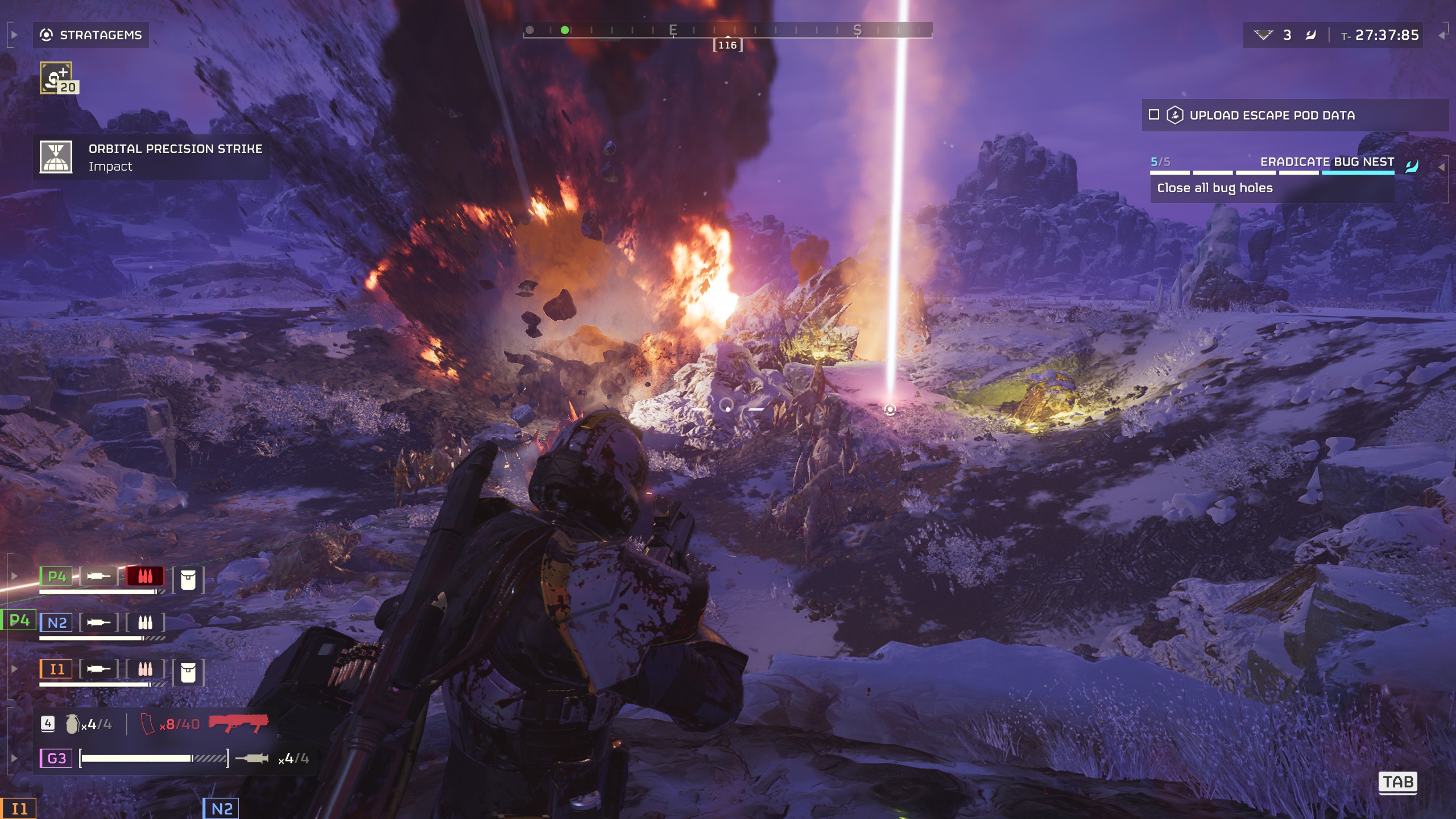
This is the kind of multiplayer progression and community spirit that successful live service games feed on, that they require, and is notably lacking in ones like Suicide Squad. It also helps that Helldivers 2 isn't a contorted mess going through an identity crisis. It is overflowing with an abundance of personality and world building, but manages to exude all this character without pace-breaking dialogue or cutscenes. So much of it is down to the screams and barks of the Helldivers themselves, as they shout about the wonders of democracy while unloading clip after clip into a hideous alien bastard—their comically overzealous nationalism one of countless nods to the game's main source of inspiration: Starship Troopers.
It also helps that Helldivers 2 isn’t a contorted mess going through an identity crisis.
Crucially, Helldivers 2 manages to maintain the joy of fighting bugs and automatons drop after drop. I can't know for sure if I'll feel this way in a month's time, but I was bored of fighting Suicide Squad's purple arseholes after about an hour, so it's an improvement. I've mostly been focusing on mowing down the insectoid menace because of the war's current objectives, and I keep being delighted by their distinct behaviours that give each fight so much range and texture. I'm constantly changing my tactics on the fly as I'm forced to identify the biggest threats and unlock new bits of kit. It goes without saying, chucking an orbital laser strike into the mix, a heavy weapon that requires two people to handle, or a jump pack is so much more thrilling than getting a new rifle with slightly improved stats.
As a big fan of Path of Exile, I obviously have no issue with loot-heavy live service games that keep spitting out items with incrementally better stats, but Path of Exile also realises, just like Helldivers 2, that to maintain our attention we also need a decent variety of things to murder, and plenty of distinct tools to murder them with. Helldivers 2 does kinda have loot, in that you can find new weapons when searching points of interest, but it's absolutely not a loot-driven game. The smaller number of weapons and toys, however, have so much more impact. Deciding that you're a flamethrower guy or a machine gun guy is a lifestyle choice, and one that's going to have a significant impact on your squad.
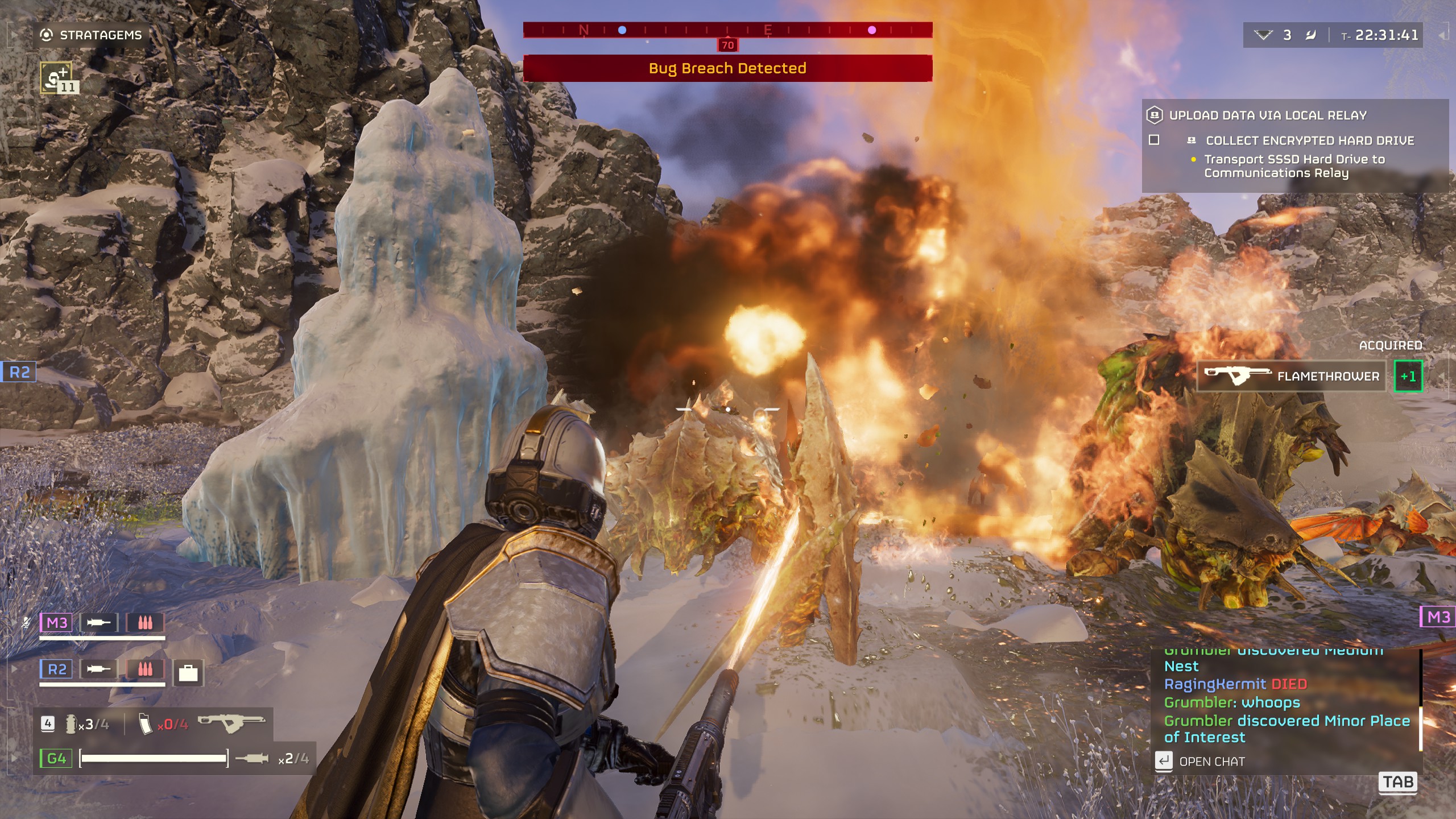
The concept of games as a service does not necessitate multiplayer, but given the origins of the live service umbrella it's definitely become a key pillar, and how they approach that pillar is definitely a critical element of their ability to thrive. There are lots of different philosophies, though. There's the Destiny model, for instance, where you're eased into things by a mostly singleplayer campaign, but where large open areas full of other players encourage you to team up, which naturally happens when events kick off and temporary alliances are forged. This prepares you for strikes and complex raids, where teamwork is essential, forcing players to communicate as they share boss strategies and work together to solve puzzles.
Squad goals
On the other end of the spectrum, Helldivers 2 is staunchly multiplayer from the get go. You can drop into a mission on your own, and lower difficulty missions can be completed solo, but you can be so easily overwhelmed that playing alone is like purposefully giving yourself a handicap. And it's simply not as much fun. You're missing out on certain weapons, and you'll never know the joys of dropping multiple orbital strikes while calling in strafing runs at the same time unless you bring some pals along.
The existence of friendly fire also makes things so much more entertaining. Accidentally setting your whole squad on fire, unleashing an orbital laser on a mate or landing your respawn drop pod on another Helldiver—I really am sorry, Sean—is a critical part of the experience. But mostly just very funny. It adds nuance to the fights, too. When you've got bullets being sprayed from every direction, you need more battlefield awareness, and it's the whole reason there's a prone button. Has someone dropped a trigger happy sentry turret onto the battlefield? Hit the bloody deck.
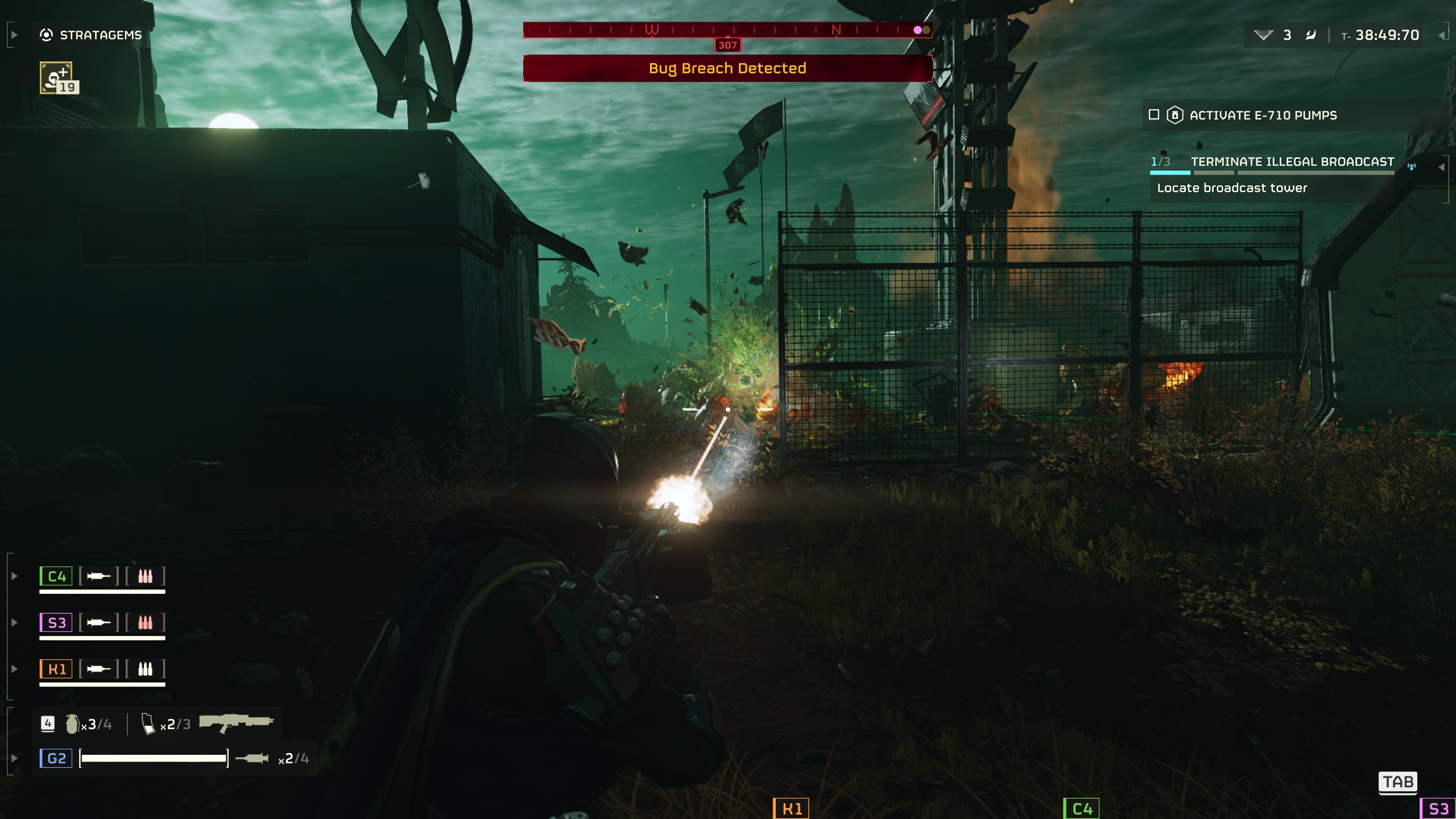
Suicide Squad, on the other hand, did little to encourage me to hang out with randos, or subject friends to the repetitive scraps. You're always in a party, and you can switch characters out of combat. And everything is so instanced, and with discrete story progression, that it all feels so incongruous to both multiplayer and the live service model. I just don't see how you can nurture a community this way. Leaderboards ain't enough, that's for sure.
Suicide Squad, and games like it, harm the very concept of live service.
In the end, Suicide Squad, and games like it, harm the very concept of live service, making it seem like a villain that ruins potentially entertaining games because all the things it does to fit awkwardly into this mould feel like concessions. Instead, it could have benefited from all that attention being poured into making it a better, more straightforward co-op shooter where you're not just endlessly fighting identikit goons on rooftops, mission after exhausting mission.
We've now reached the point in this article where I must make a mea culpa. In my early impressions of Helldivers 2, I had a wee moan about the battle pass and microtransactions. I still take issue with the ubiquitous practice of premium live service games immediately trying to sell you more stuff, but I've got to give it to Arrowhead: if you're going to include microtransactions right off the bat, this is the way to do it. Basically, everything you can buy in the rotating shop, as well as the premium battle pass itself, can be purchased for a pretty fair price, with currency that can be earned in-game at a respectable rate (if you make sure to actually explore the map during missions). It's surprisingly generous. So yeah: I was a touch harsh.
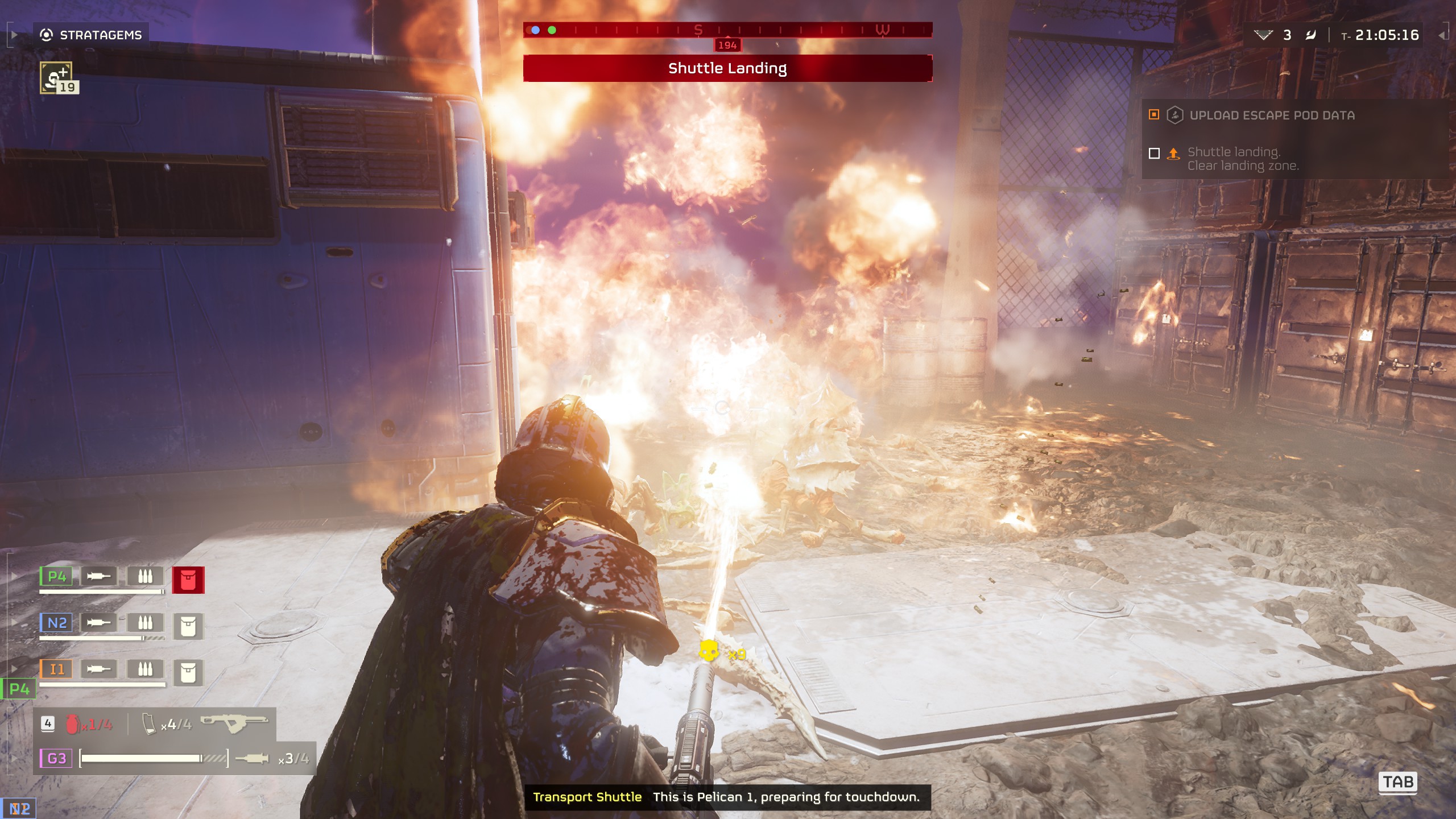
I really hope what other publishers and studios will take away from the success of Helldivers 2 is that you need to go all-in to make a great live service game. You need to enthusiastically embrace what makes these games stand apart, rather than trying to fit a square peg into a round hole all in the name of trend-chasing. And even then, success is far from guaranteed.
The last few years have been littered with the corpses of failed live service games, not because they were all shite, but because they inherently require a dedicated playerbase, and most people simply don't have the time or inclination to support the vast number of them that appear annually. They are not a golden ticket—they are complex, arduous to make, and even harder to maintain, and even the biggest and brightest must contend with endless drama and frequently make mammoth-sized mistakes that turn their communities against them. It's frankly absurd that so many publishers—so many risk-averse publishers—are willing to take a punt on them. But hey, sometimes that gives us a game like Helldivers 2. So it ain't all bad.




